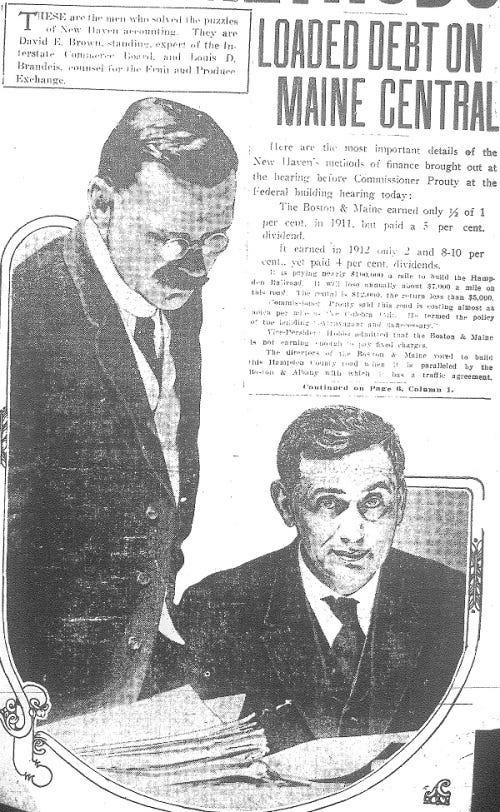A Man in Mark Zuckerberg's Position Can't Afford to Be Made to Look Ridiculous
He can appear a God or a devil, but not a mediocrity.
Welcome to BIG, a newsletter on the politics of monopoly power. If you’d like to sign up to receive issues over email, you can do so here.
One of the great anti-monopolists of the 20th century was Louis Brandeis, an antitrust and labor lawyer who eventually rose to the Supreme Court. He earned his public credibility by tangling with the railroads, and in particular, with J.P. Morgan’s New Haven Railroad, which had an impressive pedigree of board members, such as oil magnate William Rockefeller and CEO Charles Mellen. Under Mellen’s leadership and with Morgan’s permission, the New Haven Railroad borrowed money to buy up trolley lines around Boston, as well as shipping, water and electric utilities, and rail routes.
In doing so, it accumulated a lot of debt. For a time, Brandeis’s campaign against this roll-up made little progress, but he eventually realized that the firm was not just malevolent, but financially weak. In 1907, Brandeis “published a pamphlet titled Financial Condition of the New York, New Haven and Hartford Railroad Company , in which he claimed that the New Haven was using shady accounting tricks to make it appear that it was operating at a profit, when it was actually losing money.” Brandeis was roundly mocked by experts, who were often on the payroll of Morgan. Who was this lawyer who thought he knew better than the greatest minds in railroading?
That is, until the New Haven began falling apart. Accidents piled up and trains were routinely late. Because of its high debt load, the firm was in fact losing money and underinvesting in its assets. When it suspended its dividend, the game was up. Woodrow Wilson broke up the New Haven Railroad. Mellen looked not just evil, but ridiculous. And he was criminally indicted.
I bring up this story because it says something about how business scandals work in America, at a time when the law is uncertain. The great sin isn’t being malevolent, or powerful, but incompetent. It wasn’t the accounting fraud or monopolization that undid Mellen, but trains being late and dividends being cut.
All of which brings me to Mark Zuckerberg and the coterie of executives in Silicon Valley. Facebook has had serious political problems since 2007, when it launched the privacy-violating feature called Beacon. Since then, the firm has signed two consent decrees with the Federal Trade Commission which included a $5 billion fine, and is being threatened with a break-up by government enforcers. Zuckerberg personally may have violated insider trading laws, state officials have indicated that the firm might have engaged in price-fixing with Google, and ad fraud is rampant.
Today, whistleblower Frances Haugen testified to the Senate. Though I disagree on some of her policy recommendations, I was very impressed with her fluency and presentation. That said, it’s the documents she offered that matter, and in particular, this one, which indicates Facebook deceived investors and advertisers about their true reach. As Kevin Roose noted, Facebook appears increasingly weak.
All of that falls into the bucket of ‘Mark Zuckerberg is evil,’ which is just a variant of the puffery we see around CEOs. Being a God and being the Devil are not in fact any different in terms of PR, because both imply that the being is beyond reach by mortal humans. A ‘ruthless charge ahead at all costs’ domineering CEO still demands respect, because he gets stuff done.
But yesterday, Facebook went down for six hours, with WhatsApp, Instagram, and Facebook Blue unreachable. Advertisers suffered, as did businesses that rely on Facebook, and hundreds of millions of people couldn’t communicate as they were used to. With that, it became clear that the consolidation of these various social networks into one giant firm is inefficient and costly. Zuckerberg came to look not evil, but ridiculous. And that he cannot afford.



Are the anti-monopoly efforts by congress real or are they just being used as a cudgel to force tech companies to censor content?
This is a wonderfully eloquent piece. Thank you for doing what you do.